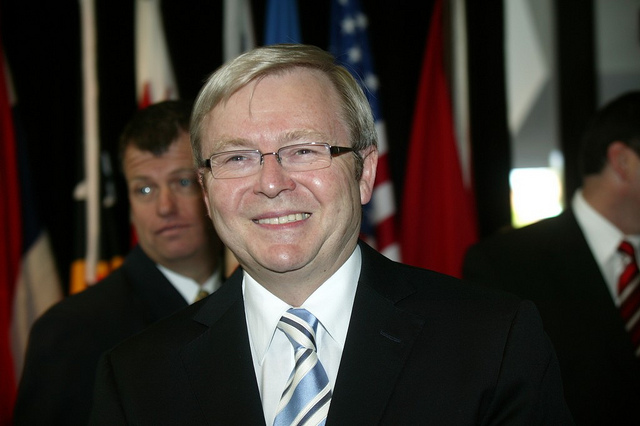Christians are divided after Kevin Rudd announced this morning he’s changed his stance on same sex marriage.
Mr Rudd said after “a lot of reflection, over a long period of time” he’s moved from being against same sex marriage to supporting it. His announcement comes a few weeks before an expected conscience vote in Parliament on the issue.
In a long statement explaining his change of heart, Mr Rudd argues if the secular state allows for gay marriage, churches and religious institutions should not be forced to marry homosexuals.
“I believe the secular Australian state should be able to recognise same sex marriage. I also believe that this change should legally exempt religious institutions from any requirement to change their historic position and practice that marriage is exclusively between a man and a woman,” he writes.
Speaking to a media pack later today, he phrased it this way:
“Surely Australia is grown up enough in the year 2013 for the secular state to have its definition of marriage, religious institutions and the Christian church to have their definition of marriage, and for them each to be able to conduct their own ceremonies. That’s it in a nutshell.”
His rationale, according to the statement which has been published online is that the Bible’s teaching on various topics shouldn’t be taken literally.
“…the definition of Christian ethics is subject to change, based on analysis of the historical context into which the biblical writers were speaking at the time, and separating historical context from timeless moral principles, such as the injunction to ‘love your neighbour as yourself’,” writes Rudd.
In this sense, his position goes further than other Christians who support legalisation of same-sex marriage on the grounds you can believe homosexuality is a sin and still hold if the majority of Australia wants to legalise same sex marriage, then the church shouldn’t stand in the way.
As Tim Keller explained recently, while not being his position, this is the growing middle path of many Protestants. However, this is not Rudd’s rationale. He is instead basing his stance on a particular interpretive model for discerning Christian ethics from the Bible.
In his explanation, Mr Rudd writes: “…if we were today to adhere to a literalist rendition of the Christian scriptures, the 21st century would be a deeply troubling place, and the list of legitimized social oppressions would be disturbingly long.”
This approach to the issue has some Christians shaking their heads, including Dr Gordon Preece, Director of Ethos: EA Centre for Christianity & Society and editor of the book Sexegesis.
Mr Preece says the former Prime Minister has forgotten his hero Bonhoeffer.
“WWBD – what would Bonhoeffer (his and my hero and model for Christian political action) do? And how did he interpret Scripture on this issue?”
“Bonhoeffer clearly upheld Scripture’s argument against homosexual practice. He saw our embodied, male and female humanity as something not simply subject to the social change of “man come of age”. Instead it is an expression of God’s trans-cultural creation mandate to all people.”
In his statement on same sex marriage, the former Prime Minister says the “Christian tradition since Aquinas is one based on a combination of faith informed by reason”, arguing reason prevents “theocratic terrorisms where the stoning of heretics and the burning of witches would still be commonplace.” It is on the basis of reason combined with faith that Mr Rudd says he supports same sex marriage.
However, Gordon Preece says Rudd is forgetting the emphasis Aquinas and other great thinkers Christian put on Scripture:
“Kevin Rudd argues from Aquinas’ accommodation of faith and reason to reject oppressive biblically literalist or fundamentalist perspectives. It’s true faith does seek understanding, but this tradition of the three big A’s of theology, Augustine, Anselm and Aquinas still prioritised Scripture, using reason to understand it, while standing under it.”
Until now, the obstacle to his support of same sex marriage, says Rudd, has been the potential impact on children of having same sex parents. To this end, Mr Rudd says he’s been reading overseas research on the issue and is satisfied parents of the same sex “are no worse off” than those with a Mum and a Dad.
Mr Preece says aside from looking at empirical studies, there are potential issues with a child’s access to their genetic parent and/or surrogate mothers (when raised by two gay men). He also argues surrogacy is a complex ethical issue when there have been cases of exploitation among the poor.
On the issue of whether or not gay marriage is inevitable and Christians should just give up fighting, Mr Preece says there’s good reason to prepare for change, but it’s not the time for a ceasefire.
“It is likely, though not necessarily inevitable—which is a poor and bullying category confusing futurology and chronology with morality – sit down and shut up you’re in the way of history!—we will have gay marriages soon and it’s best that we prepare as Christians to separate state and church marriages.”
“However, concerns about the vulnerable, those from below, the voiceless—the children—make me hesitate and fight on over this issue.”
Speaking to the media earlier today, Mr Rudd called for “civility” in the national debate, accusing both sides of mudslinging. But he continued to defend the right of all voices to be heard.
Image Source: Flickr under CC licence. User: Australian Civil-Military Centre
Email This Story
Why not send this to a friend?
